Getting Real About Managing Up
From QCon NYC, 2019
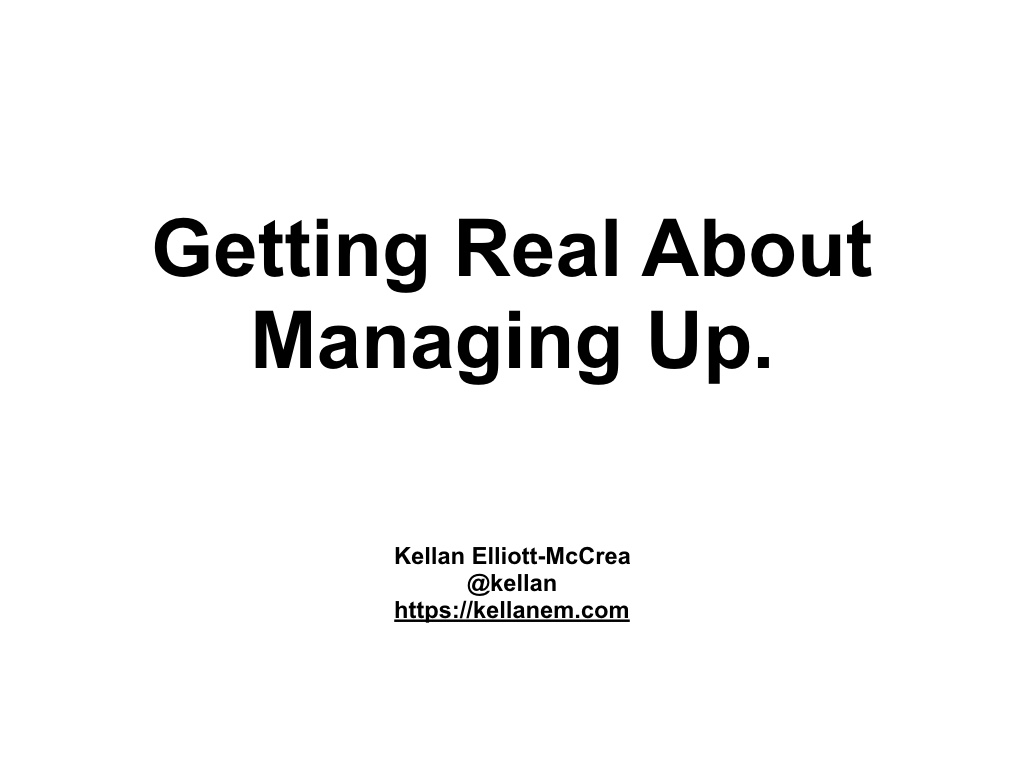
Hi!
#
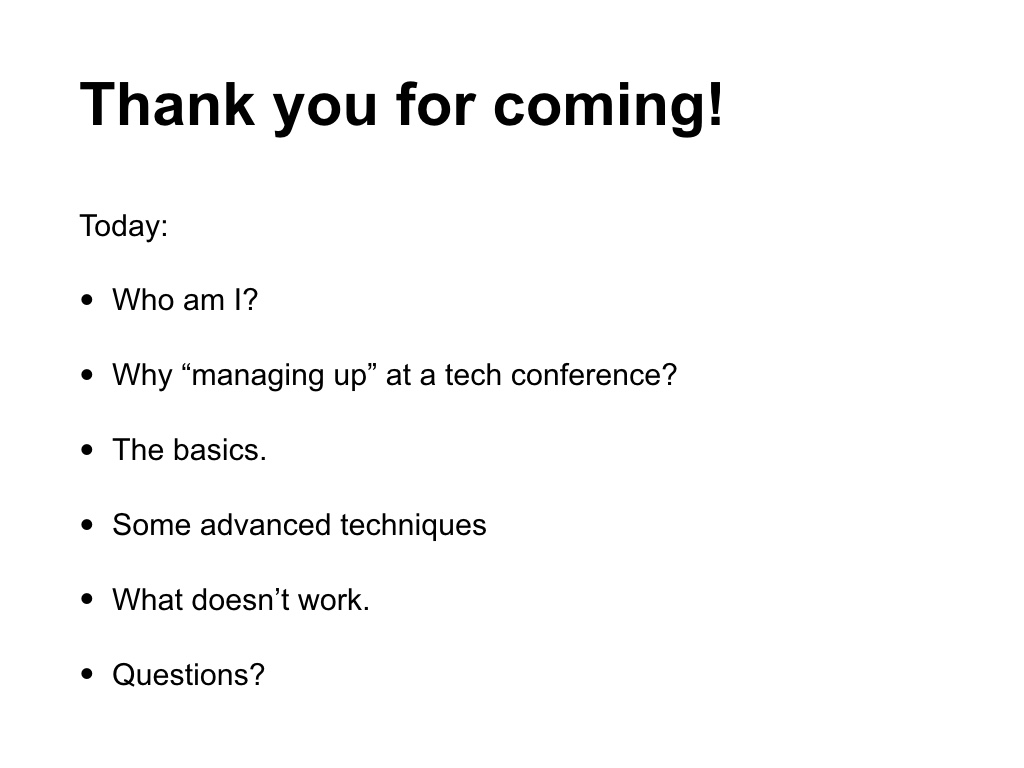
Most engineers, as hyper rationale beings above the fray of emotional persuasion are kind of “Ugh, do we have to” when the topic of managing up comes up, so thank you for coming!
#

My name is Kellan Elliott-McCrea. Cards on the table. I’m the person you manage up to. (experience: Etsy, Flickr, various startups)
But I also advise and coach. (30+ companies)
This talk is drawn from all of that experience.
When Jean asked me…
#
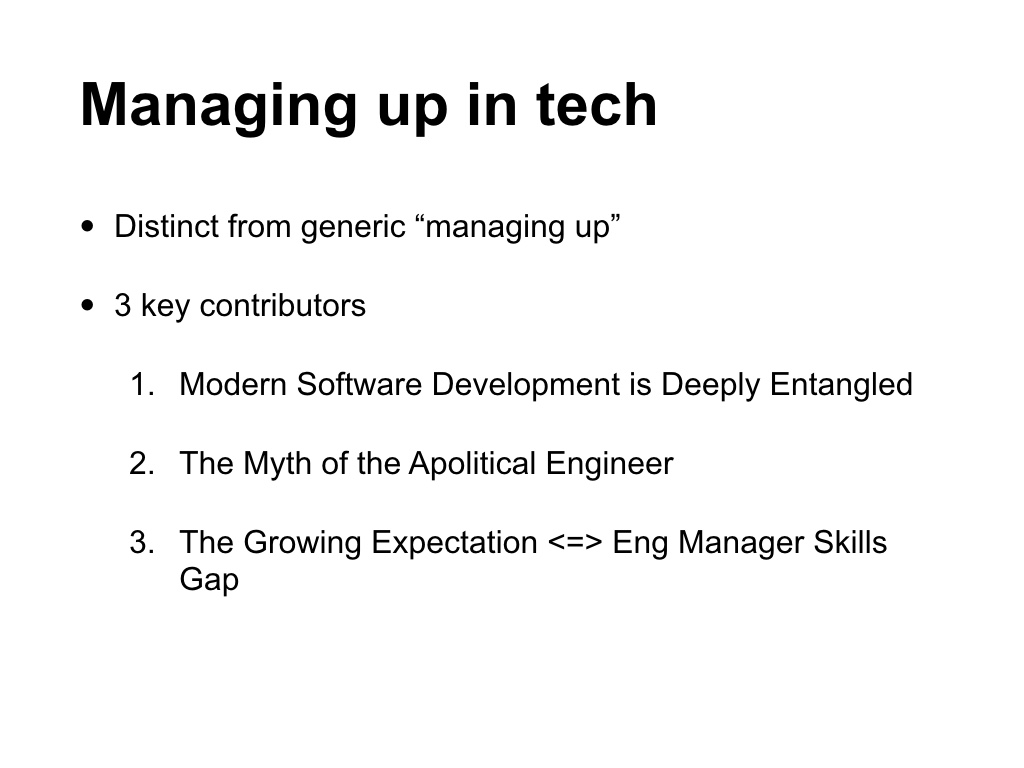
I believe engineering management is a distinct discipline from just management.
Similarly managing up in technical organizations has some unique characteristics.
Why? There are 3 key contributors.
#
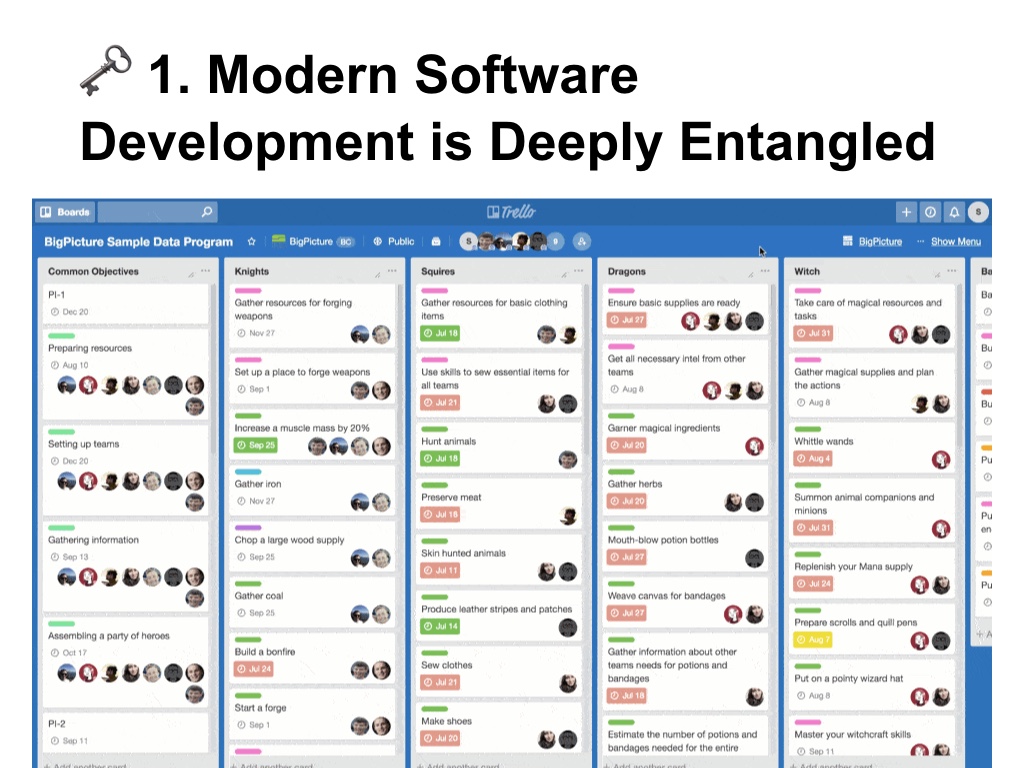
Modern software development, is fast paced, collaborative, iterative, experimental, built on deep and changing abstractions by cross functional teams.
To be good at it requires being good at collaboration, coordination, communication, planning, prioritization aka “Management skills”.
#
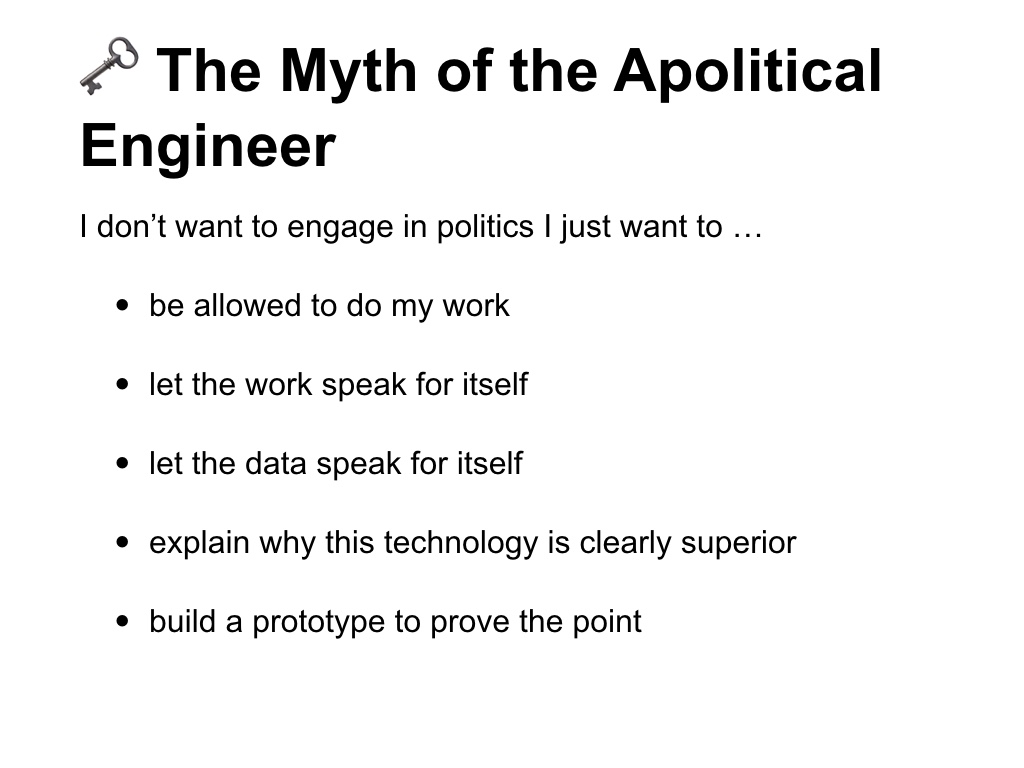
The second key contributor to why managing up in tech is so different is we allow ourselves to believe that we’re apolitical.
I have a good news and bad news for you.
Bad news: none of the above tactics are how groups of humans make decisions.
Good news: if any of the above have worked for you, congratulations you’ve got a decent manager out there trail breaking for you.
#
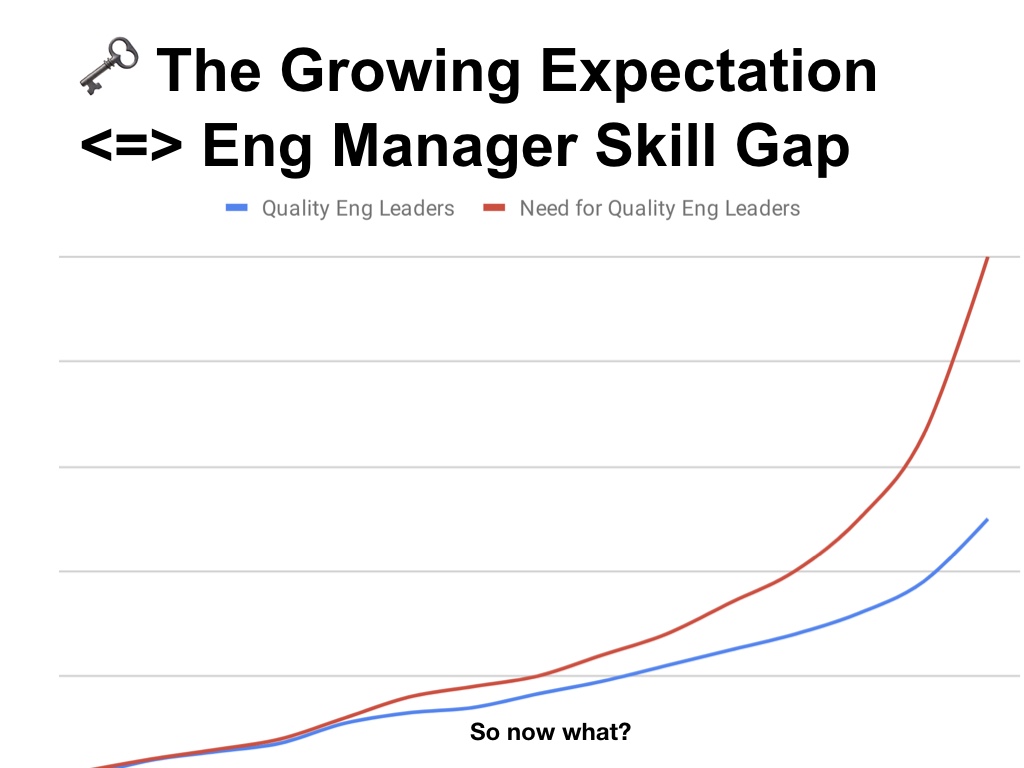
Again good news/bad news. The total number of quality engineering leaders is going up! There are better resources, we’re investing more in training, we’ve figured a few things out.
Bad news – the demand is going up faster. More teams, building more complicated software, more expectation that work is fulfilling and well-run.
#
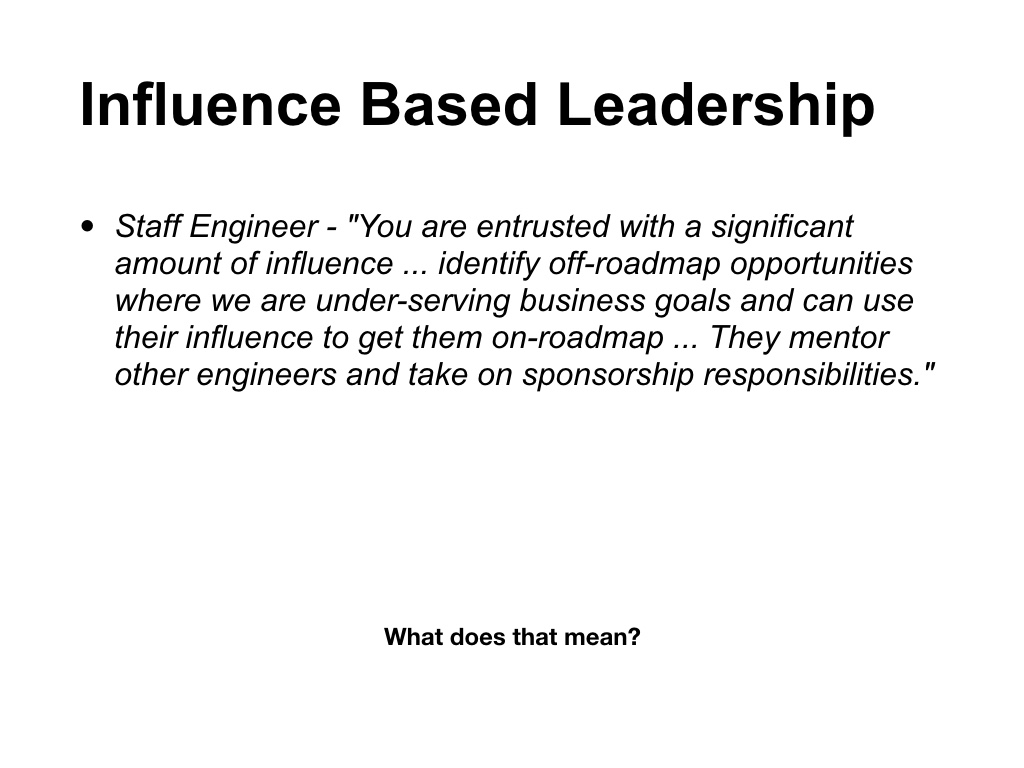
If you’ve spent any time hanging around career ladders or promotion committees in the last few years (and I mean, who doesn’t, yeah?)
Then you’ve encountered a term like “influence based leadership”.
Highly correlated with senior ICs (that managers speak for people who don’t manage), principal engineers, staff engineers, tech leads.
What does that mean?
#
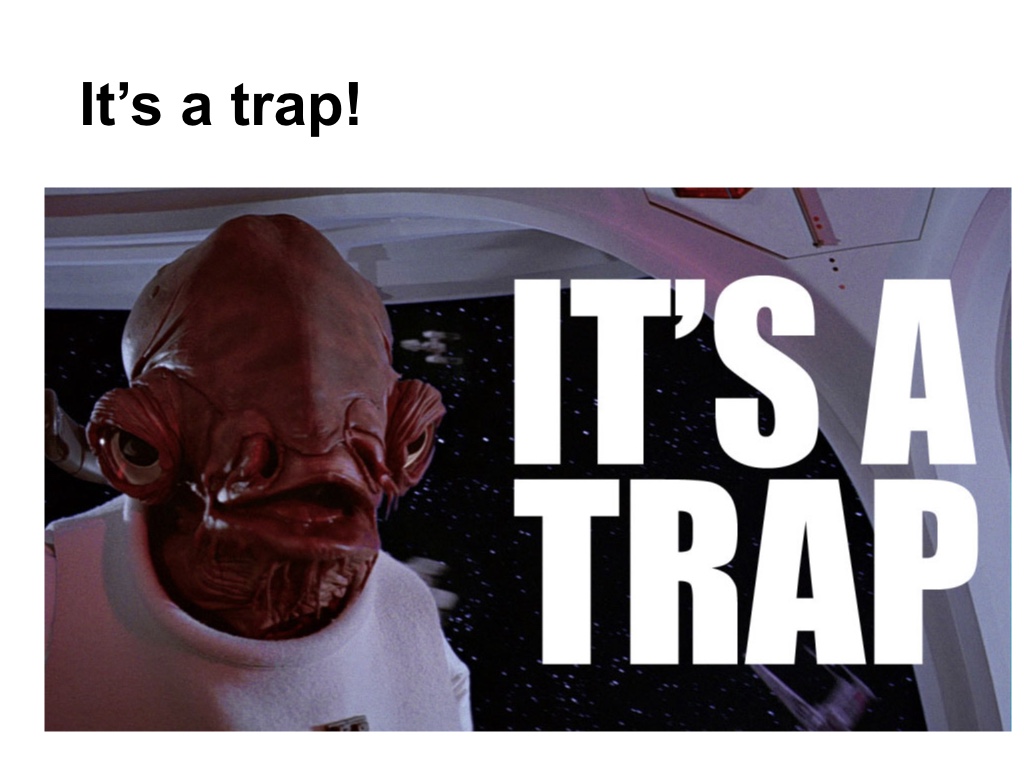
It means I, as your manager, am completely overwhelmed by the accelerating demands of my job, and I’m going to shift some of that load to you. You’re all drafted and deputized. You’re welcome.
But actually this is good news: giving you control of your own destiny
#
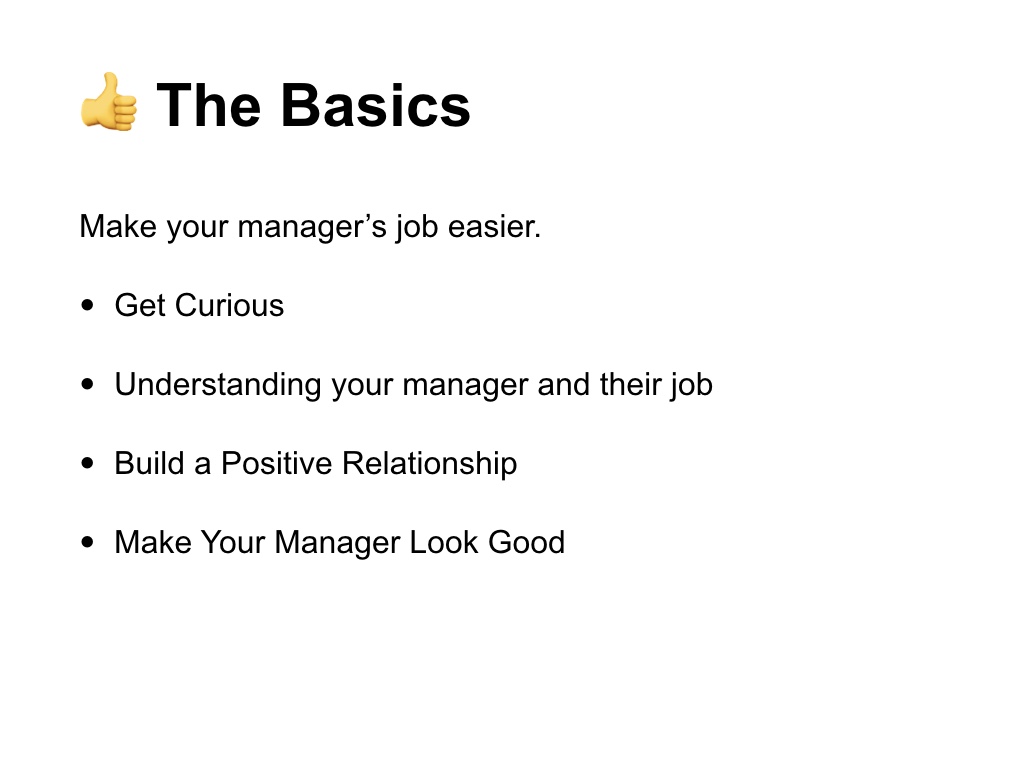
We know that the largest contributor to people’s happiness, and sense of satisfaction at work is their manager. That’s the context in which we approach managing up.
End: In tech our managers are barely keeping it together. So let’s help them.
#
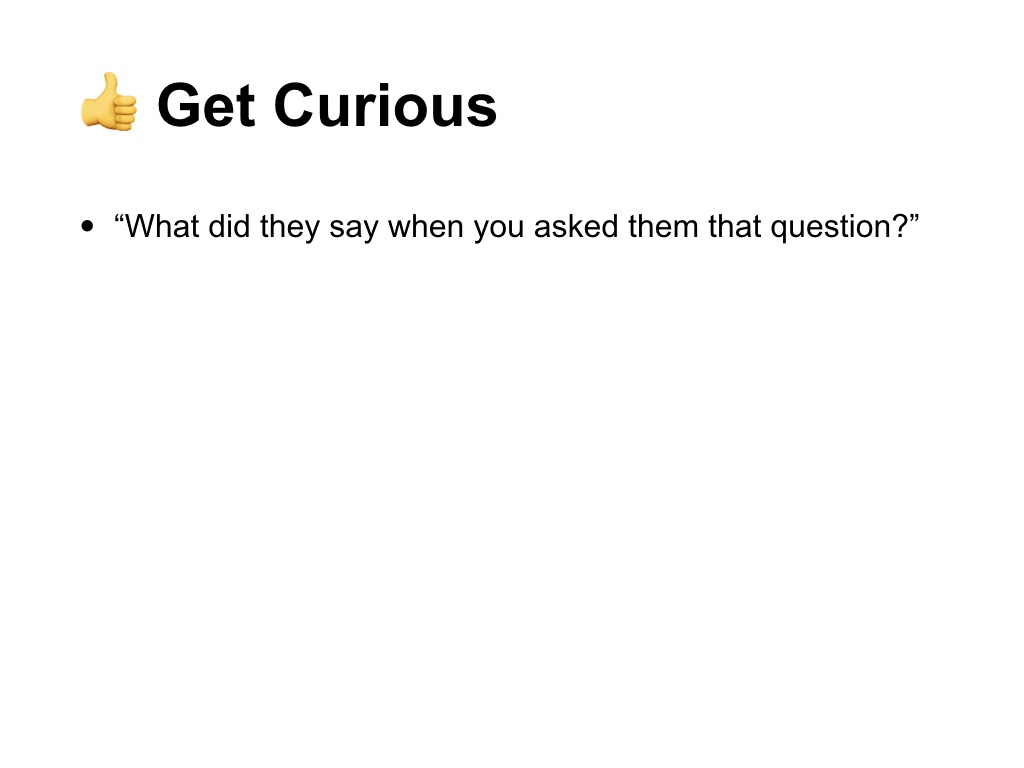
This is the foundational skill to managing up. (also down, sideways, and backwards)
End: Curiosity both shows a willingness to care about someone, and increases the likelihood that when you try to solve the problem, you’re solving the right one.
#
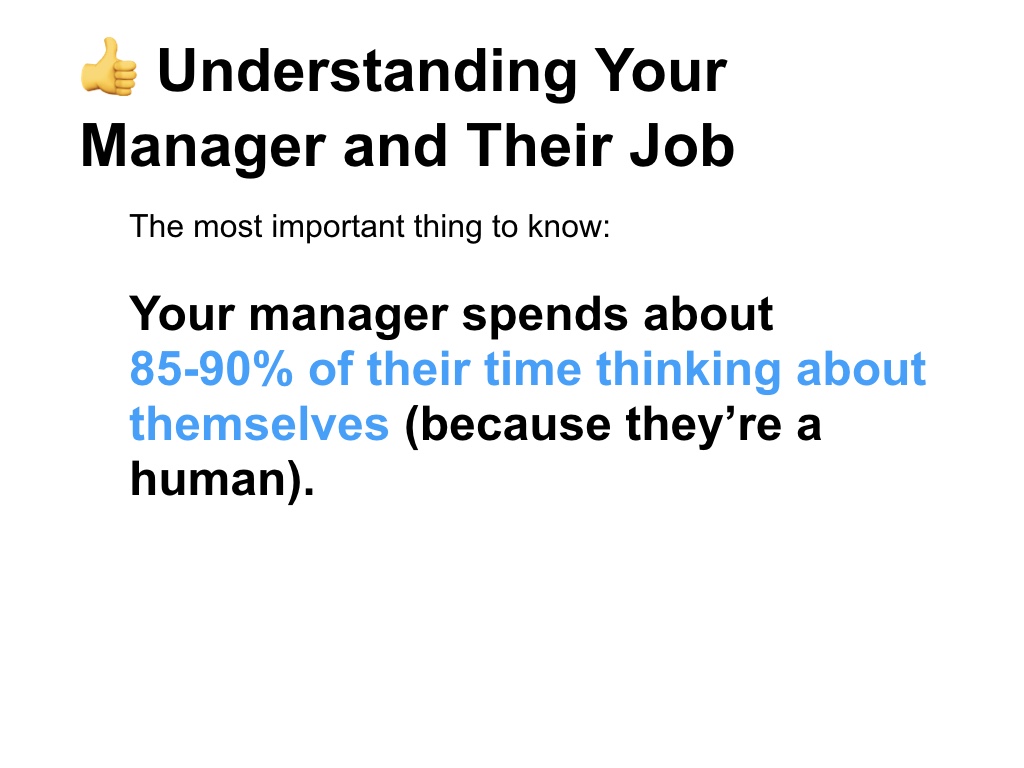
When it comes to understanding your manager…
End: The great news is that when I piss you off, it wasn’t personal. (which isn’t an excuse for bad management btw, just the reality)
#
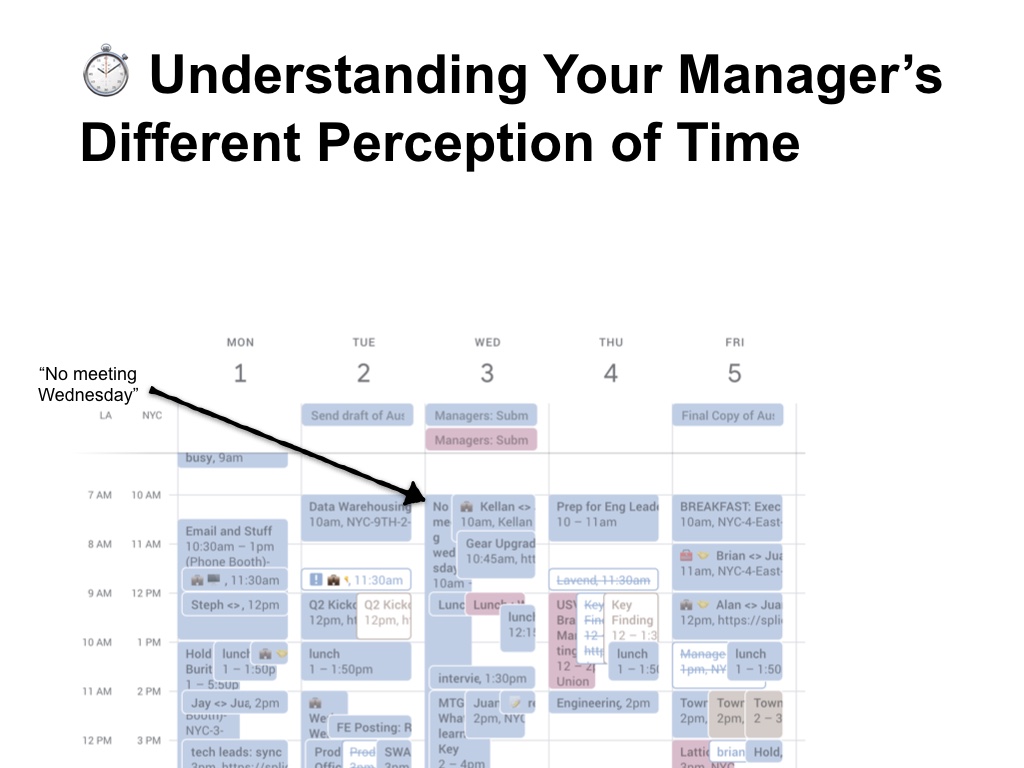
Just one example of understanding how this asymmetry of attention works
Which means, when you asked them for help two weeks ago, it was an eternity. But they’ve thought about it twice for 15 minutes since then, which means “why are you so impatient?”
#
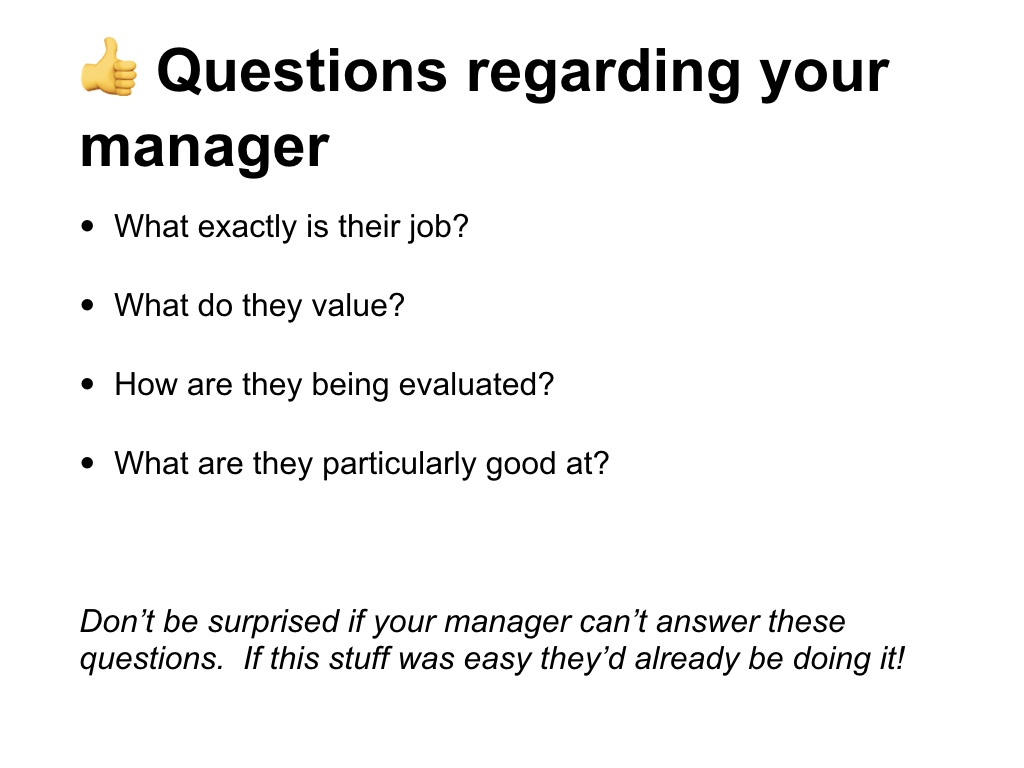
If you’ve not done their job, consider picking up a good book on the topic.
Some value tech, some value learning, some value predictability,
Good at? coaching, meetings, architecture, politics, explaining the business
#
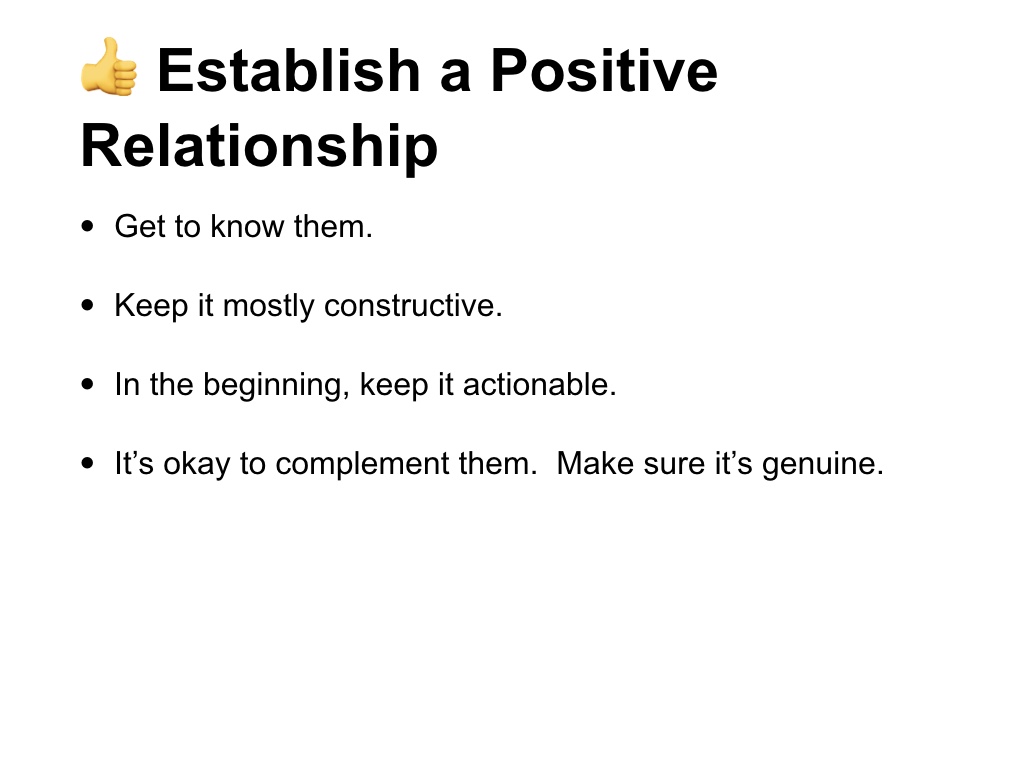
The research tell us people hear negative messages at 10x the strength of positive messages. Your balanced update isn’t being experienced as balanced.
When you’re building the relationship come with frustrations/problems they can help with. People like helping.
Complement: tell them something they’ve taught you.
End: you want them to enjoy working with you.
#
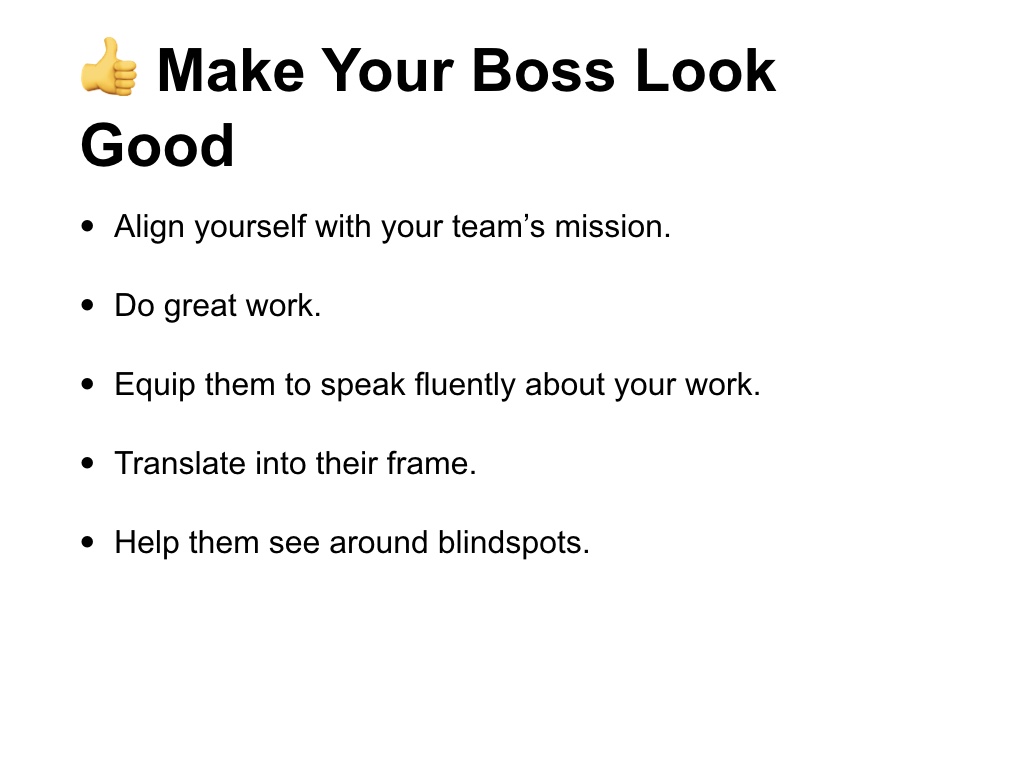
Alignment: they’re being judged on alignment. If your priorities don’t align, that’s a great opportunity for a constructive conversation.
Your boss is going to get asked about the status of project X, they can either use your description or make something up on the spot.
Blindspots: possibly the most important and mutually beneficial technique.
#
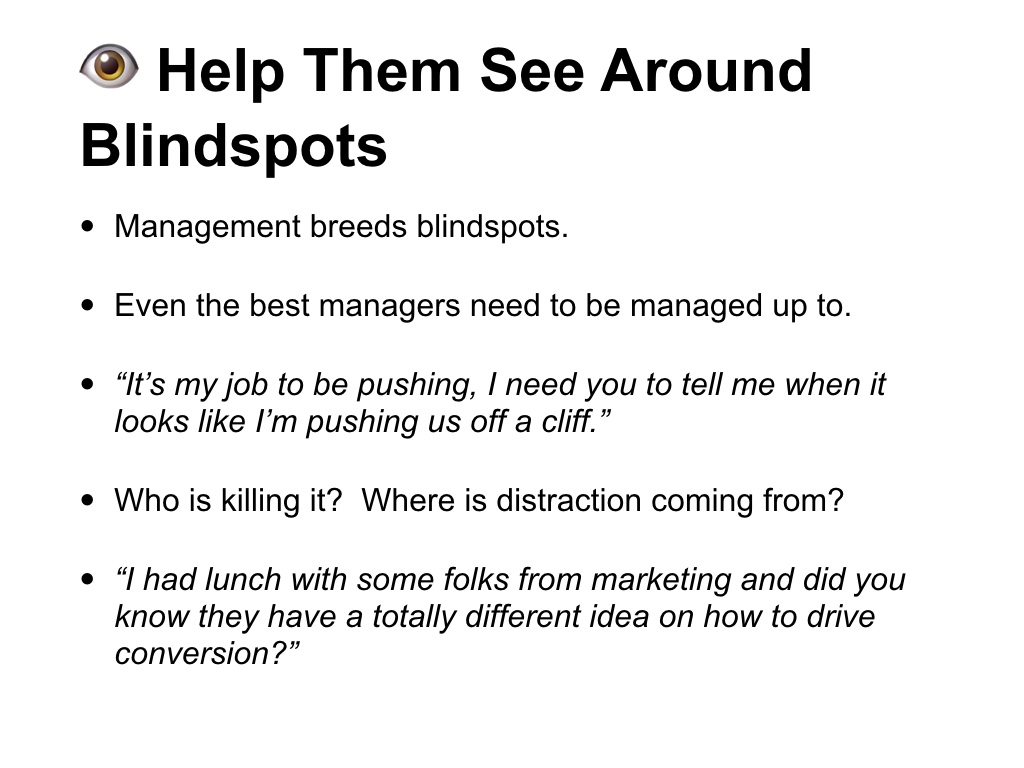
#
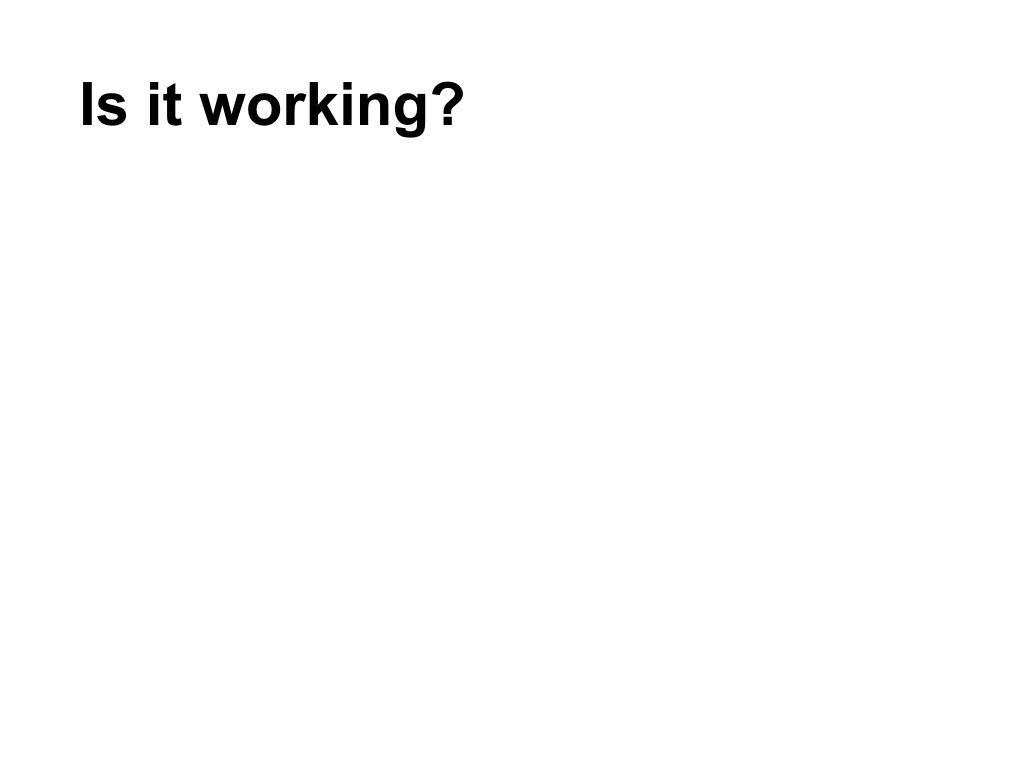
#
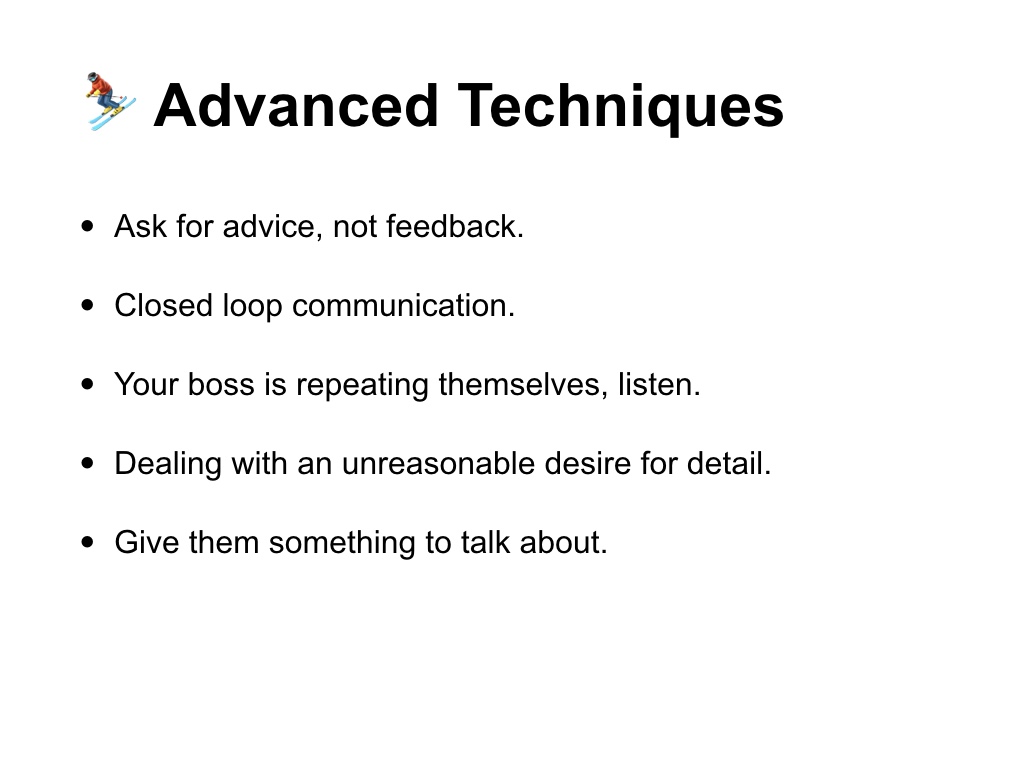
#
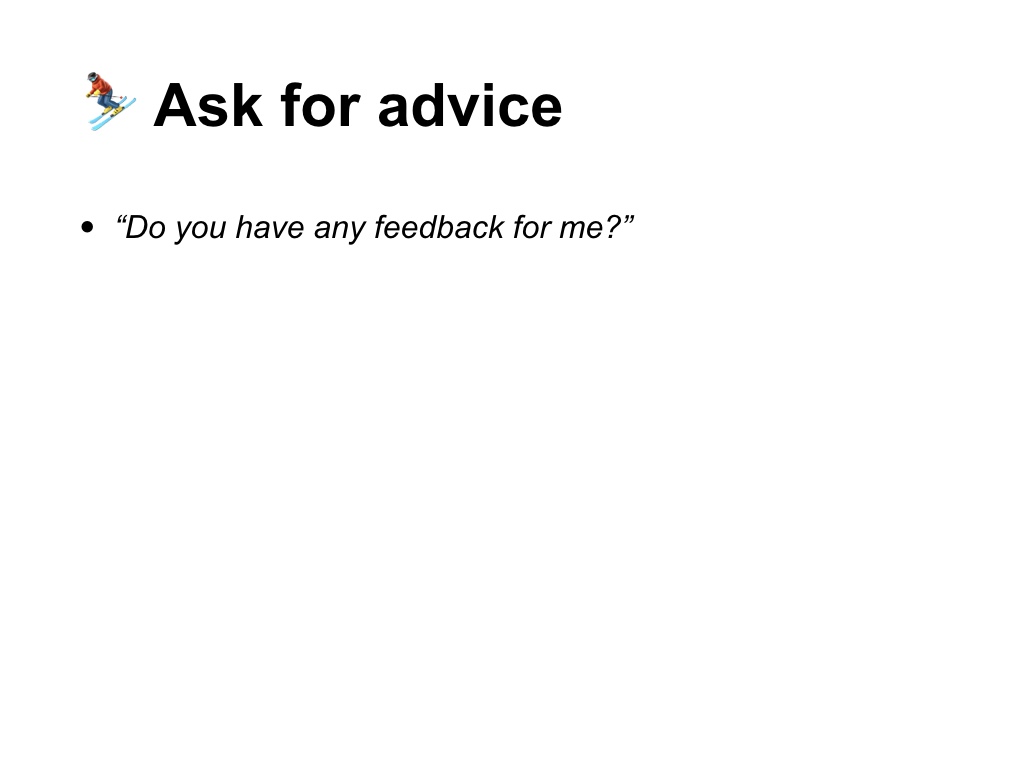
Your boss dreads this question. Um, no, I wasn’t thinking about you, I was thinking about the project. Um, uh, Nope you’re doing great!
Instead, “I’m having trouble talking to our PM about why this work is important, do you have any advice for me?”
Please _love_ giving advice. It centers it on them vs on you.
#
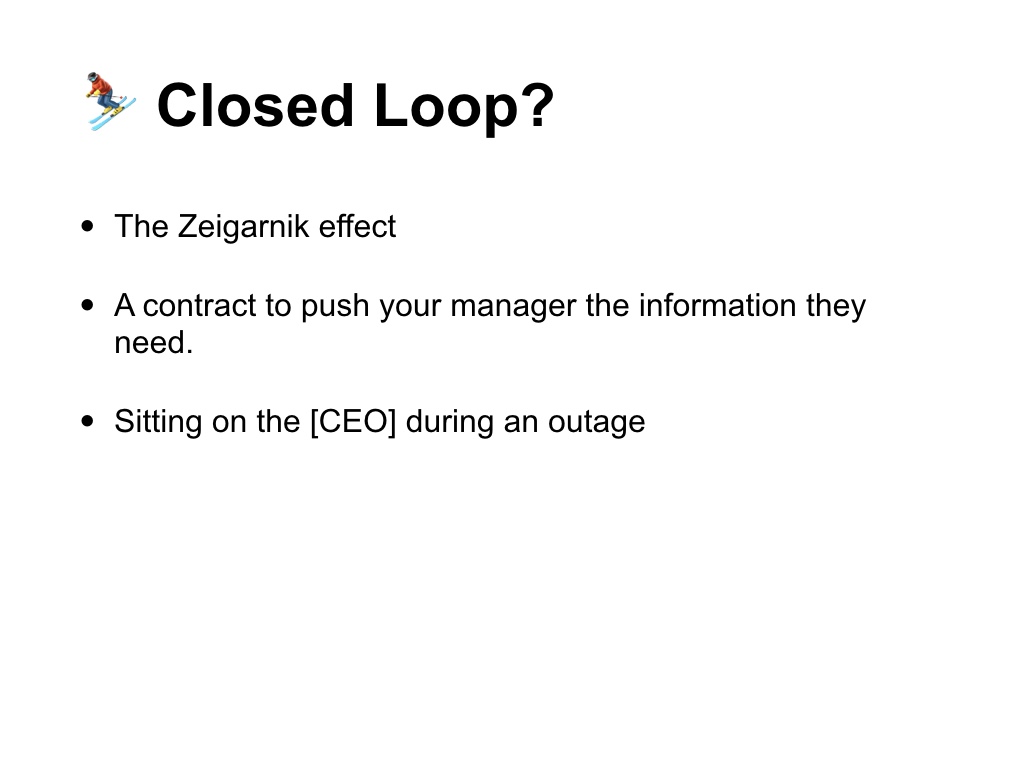
In psychology there is something called Zeigarnik effect, we obsess about things that aren’t finished, or that we’re worried we’ll forget about.
If I have to worry about … focused on doing your job instead of doing mine. And nobody wants that.
Find out how your boss best consume information and on what cadence, and push it to them.
Consistency is important.
#
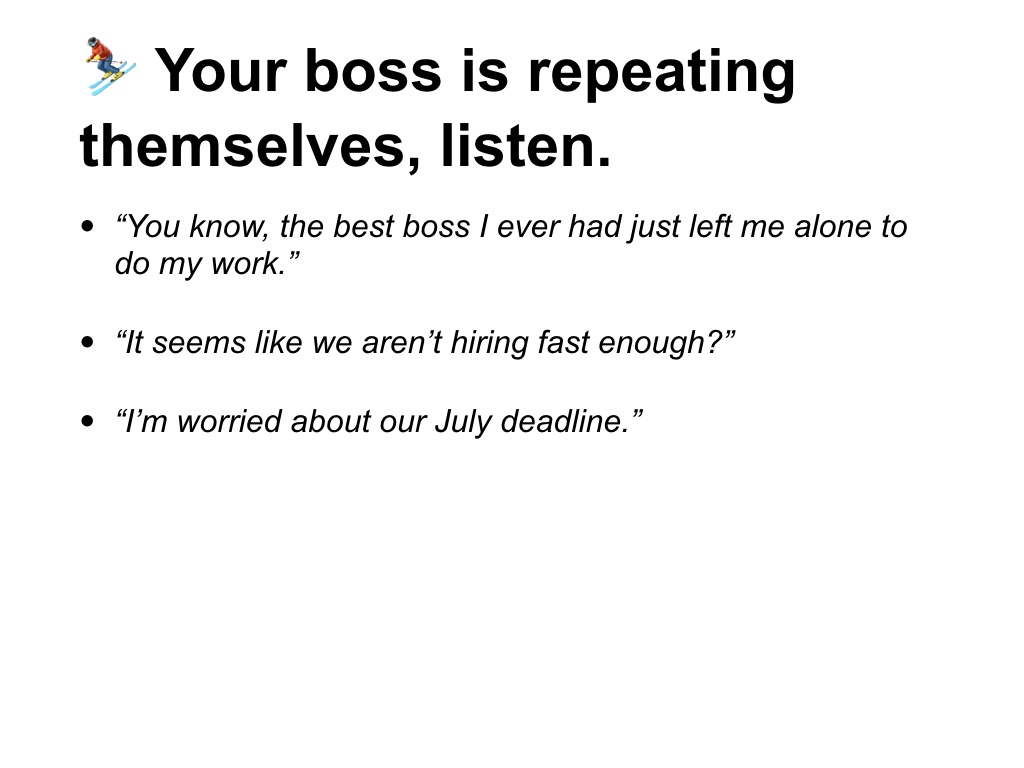
“That’s interesting. Can we get back to the part where I was asking you for help?”
“We’re hiring great people, we wouldn’t want to lower the bar.”
“You known engineers, estimates are never accurate, don’t worry about it.”
None of these are the right responses.
#
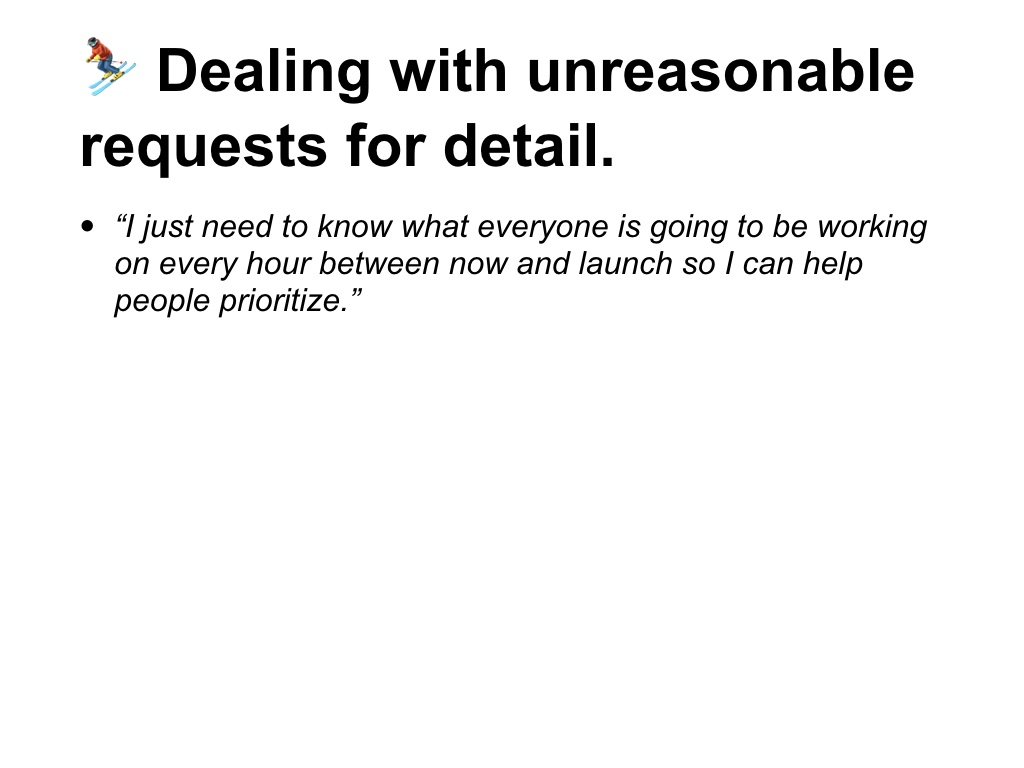
Why is X late? Well you know, the spec changed, and some surprise. Great. I can get you that, it will take some time as that isn’t how we store the information. Before I do, is there any advice you have for me on things we could be doing better? The data is a bit noisy, is there a format that would be helpful for you? You know, one metric we’ve been tracking lately is cycle time. Would you like to see that graph?
#
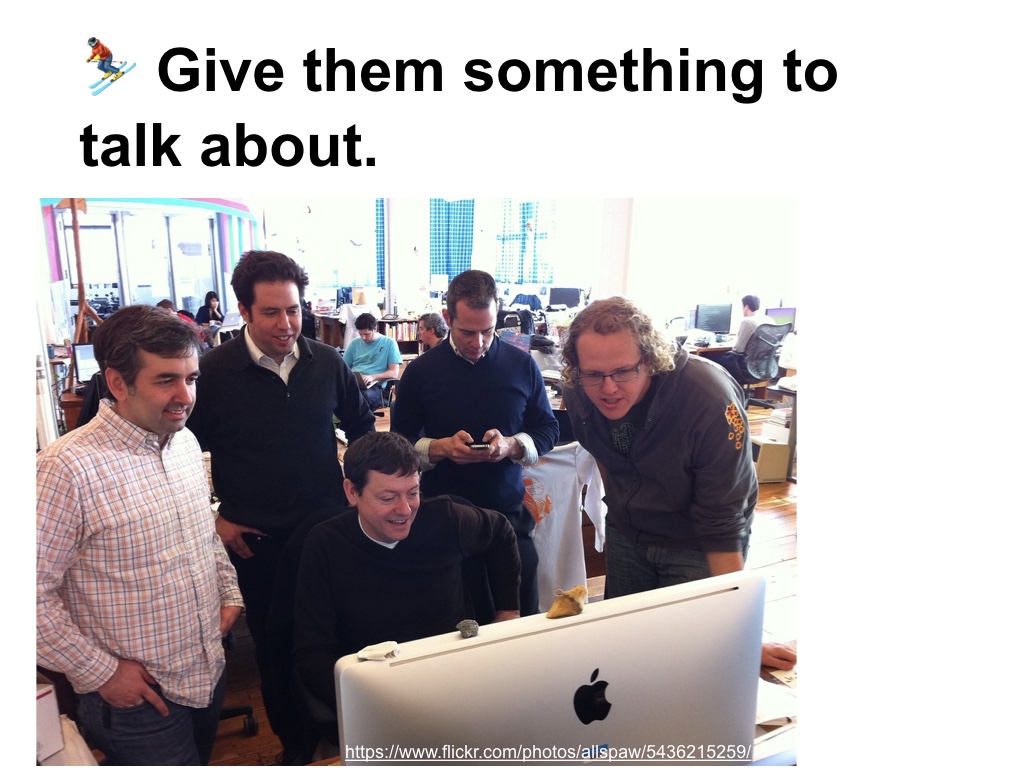
Especially effective for managing CEOs, board members, etc.
Graphs, insights, and stories are currency.
Building empathy is very powerful.
#
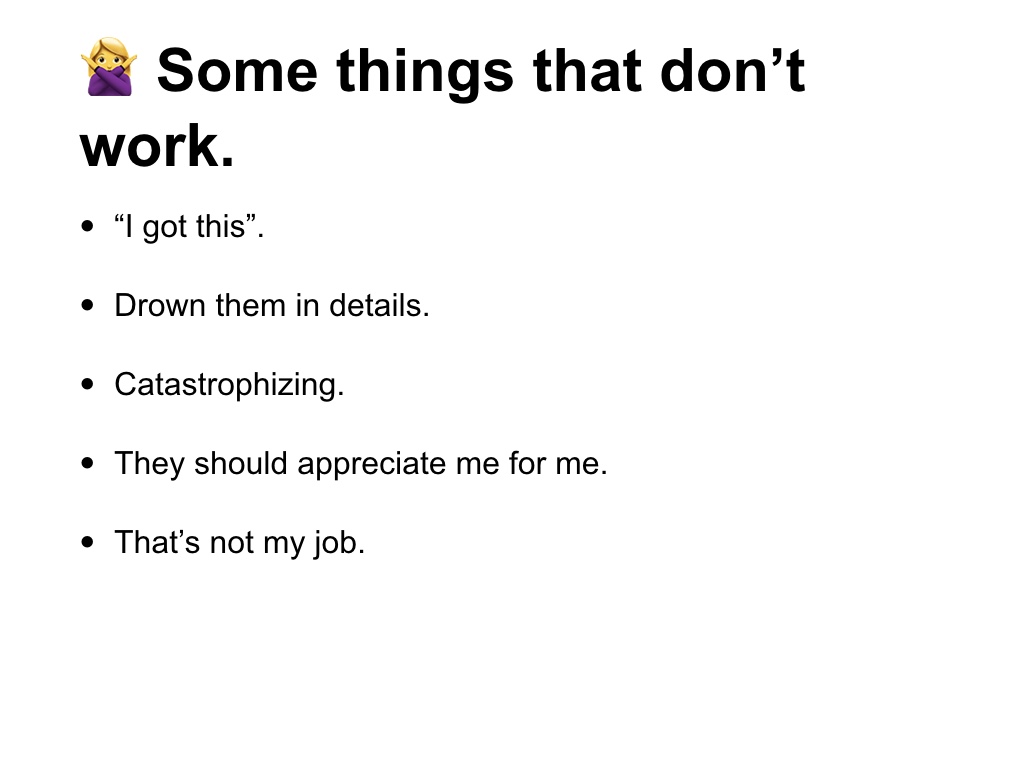
#
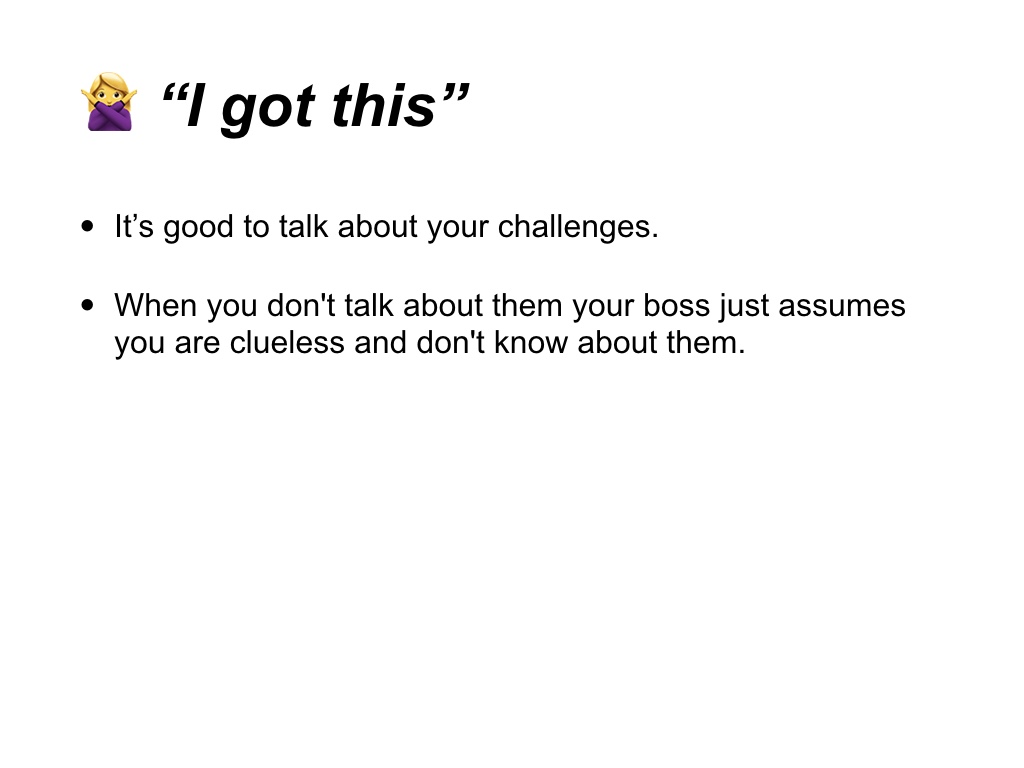
#
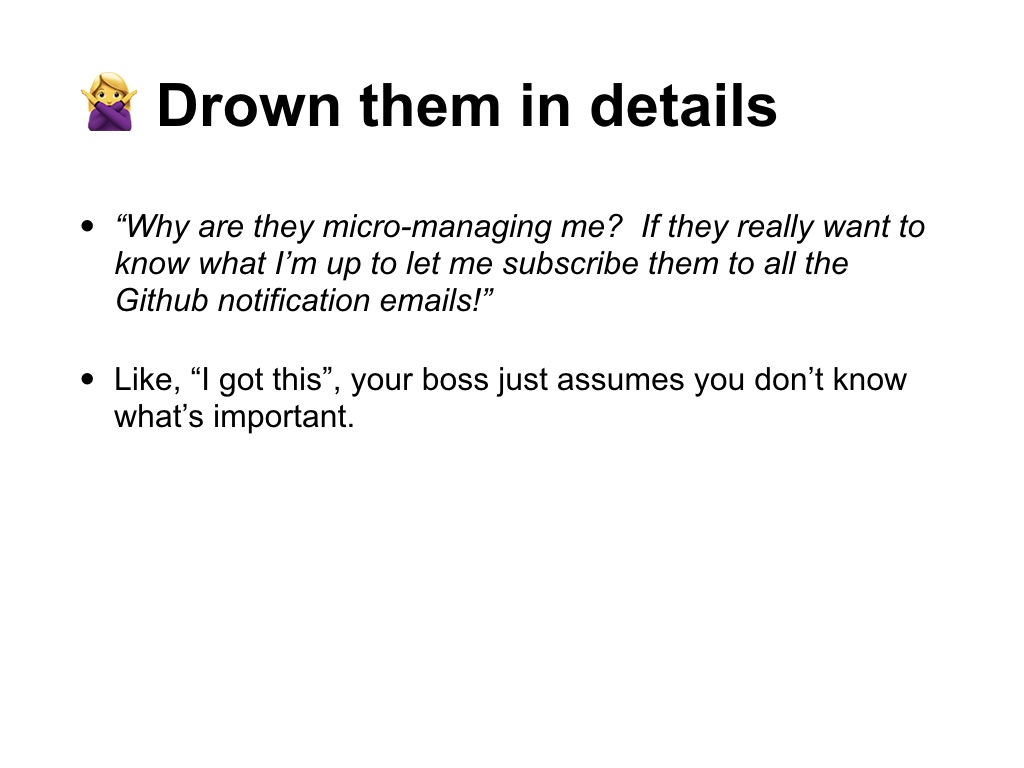
End: Btw if you ever get the feedback that you’re thinking tactically, not strategically, that means, “You’re using your vocabulary, I need to use mine so I can understand it.”
#
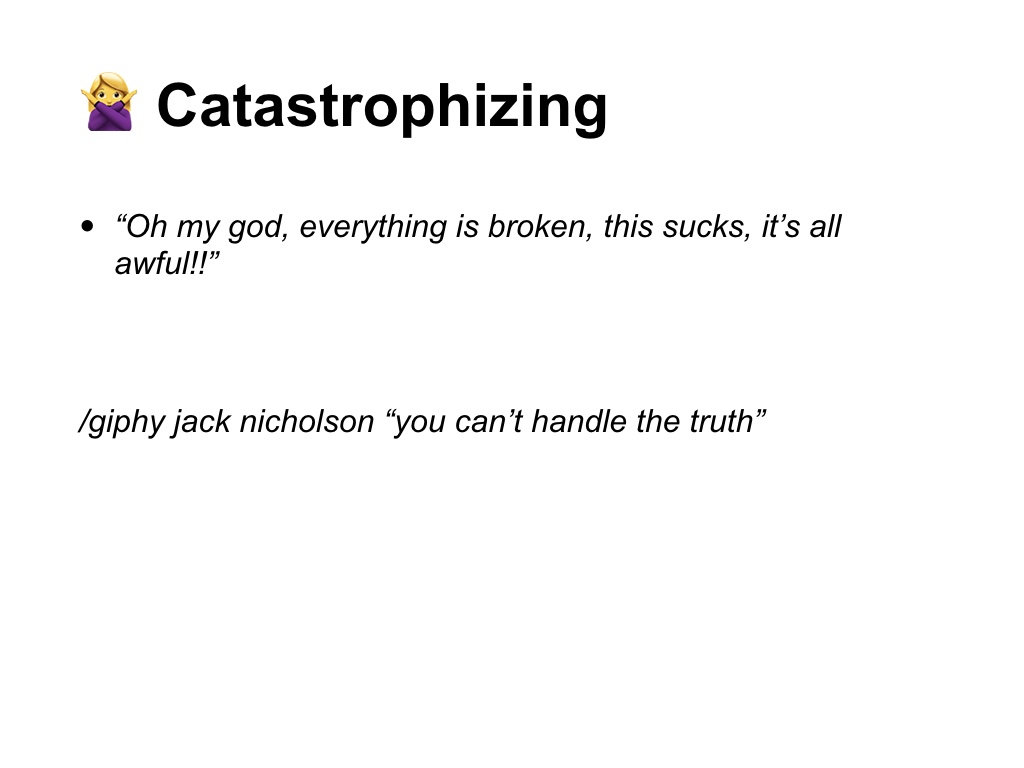
All I’m hearing is, “I can’t be transparent with X because he freaks out, I guess I’ll only include him in conversations after everything has already been decided.”
#
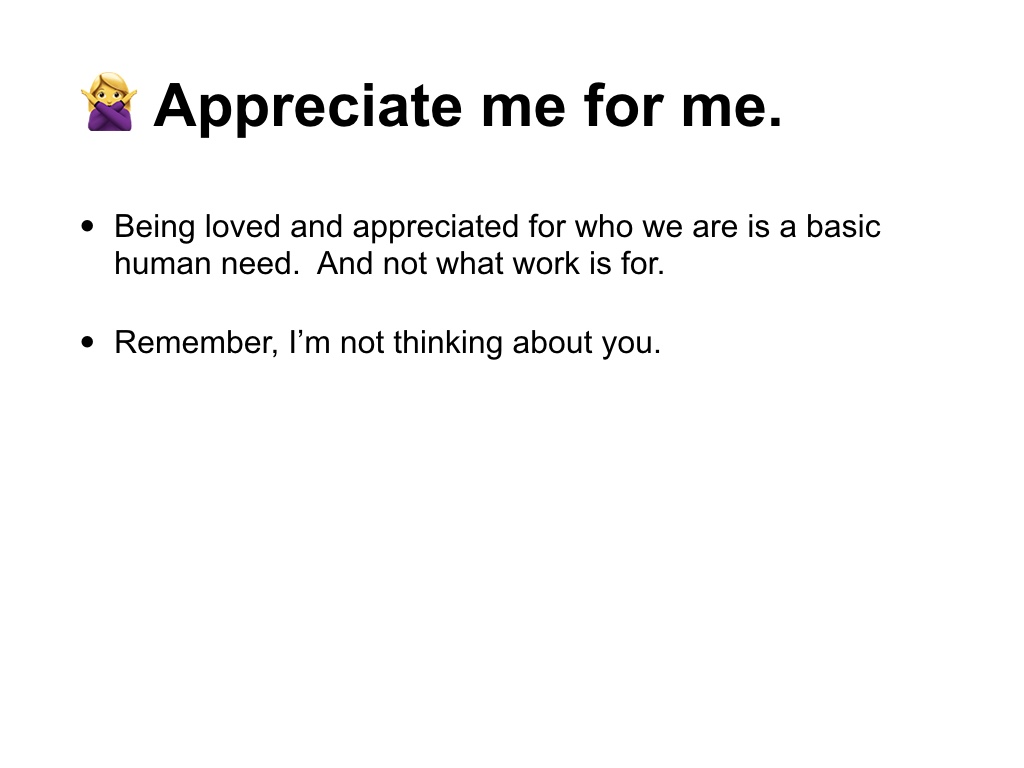
End: you will be able to talk to your boss about what you value. The relationship is a give and take. But you can’t demand it and expect to be successful.
#
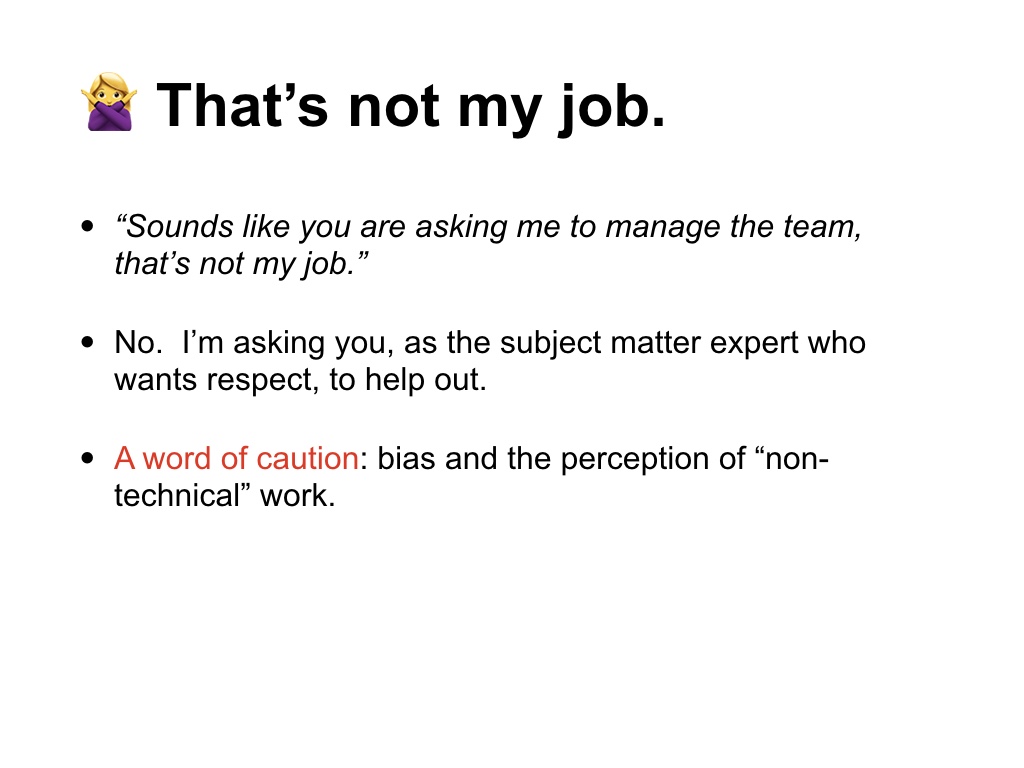
#
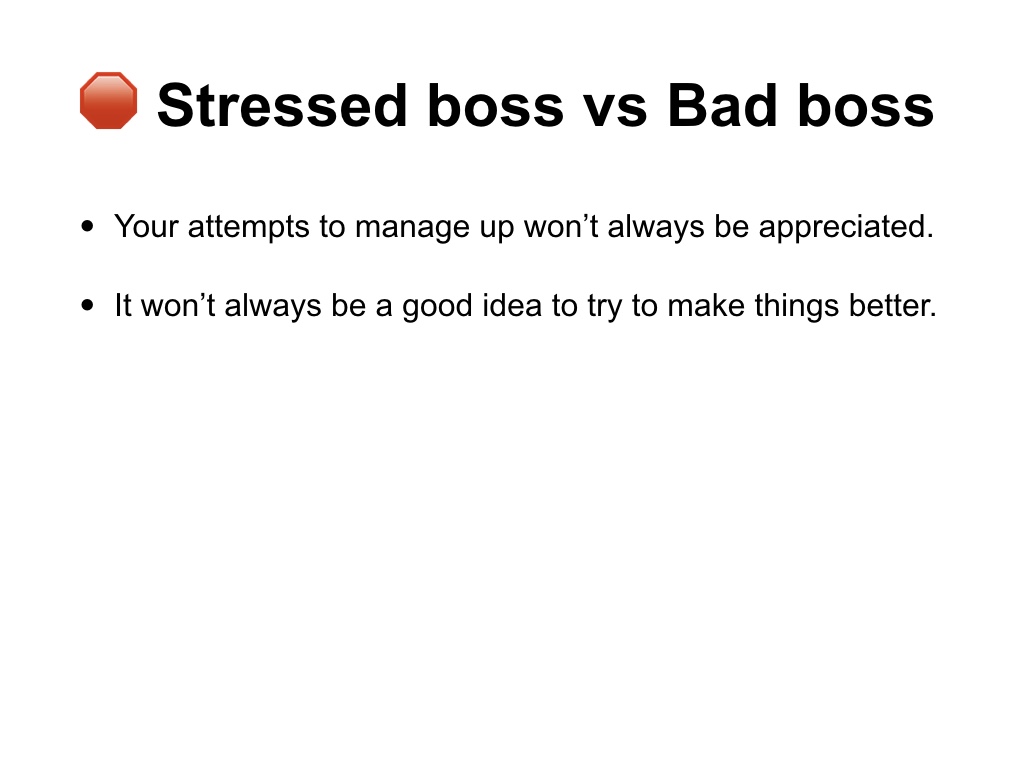
Bad bosses absolutely exist. For the sake of this talk we’ve mostly assumed bosses doing they the best they can. Which, stretched thin, likely doing a job they weren’t trained for, the best they can do may not be very good.
Even good bosses bark under pressure.
Bad bosses are something different.
But most people aren’t a bad boss. They’re just stressed and overwhelmed and need help. And that’s where you come in.
#
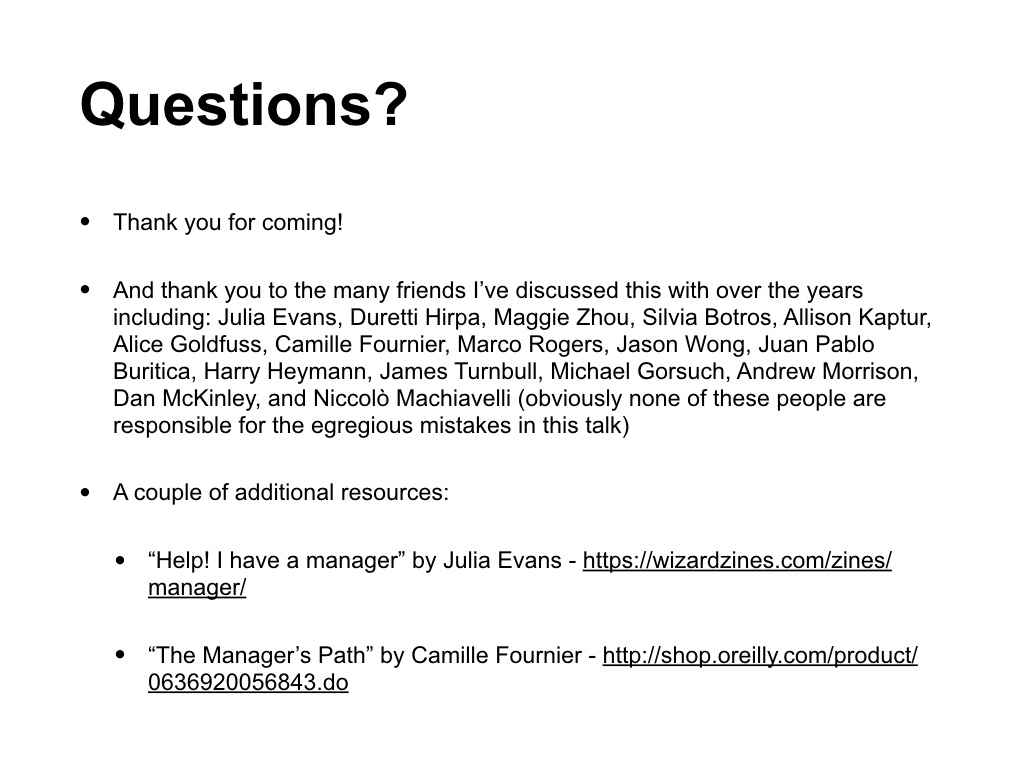
And thank you to the many friends I’ve discussed this with over the years including: Julia Evans, Duretti Hirpa, Maggie Zhou, Silvia Botros, Allison Kaptur, Alice Goldfuss, Camille Fournier, Marco Rogers, Jason Wong, Juan Pablo Buritica, Harry Heymann, James Turnbull, Michael Gorsuch, Andrew Morrison, Dan McKinley, and Niccolò Machiavelli (obviously none of these people are responsible for the egregious mistakes in this talk)
A couple of additional resources:
“Help! I have a manager” by Julia Evans – https://wizardzines.com/zines/manager/
“The Manager’s Path” by Camille Fournier – http://shop.oreilly.com/product/0636920056843.do
#
